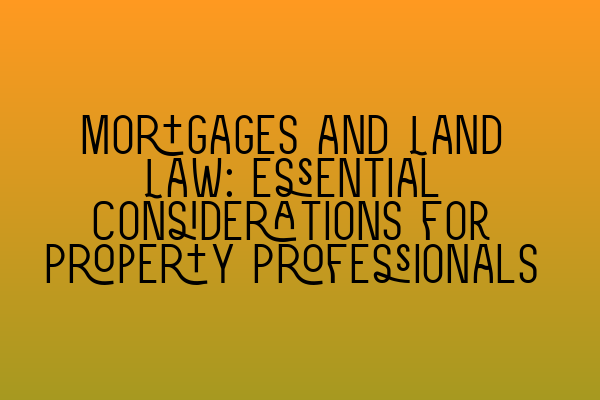Mortgages and Land Law: Essential Considerations for Property Professionals
As a property professional, it is crucial to have a solid understanding of mortgages and land law. These areas of property law play a significant role in property transactions, and it is important to be well-versed in their essential considerations. In this blog post, we will explore key concepts and considerations related to mortgages and land law, providing you with valuable insights that will enhance your expertise in the field.
Mortgages and Land Law: An Overview
What is a mortgage?
A mortgage is a legal agreement between a borrower and a lender, typically a bank or a financial institution. It is used to secure a loan for the purchase of a property. In this agreement, the borrower pledges the property as collateral for the loan, which provides the lender with the right to take ownership of the property in case of default.
How does land law come into play?
Land law is the branch of law that governs the ownership and use of land. It deals with various aspects of property ownership, including the rights and responsibilities of property owners, the transfer of property, and the creation and enforcement of mortgages.
Key Considerations for Property Professionals
Now, let’s delve into the essential considerations for property professionals when it comes to mortgages and land law:
1. Understanding the Legal Framework
As a property professional, it is crucial to have a firm grasp of the legal framework surrounding mortgages and land law. Familiarize yourself with relevant legislation, such as the Land Registration Act and the Law of Property Act, to ensure compliance with legal requirements.
Related article: SQE 1 Practice Exam Questions
2. Conducting Thorough Due Diligence
Prior to entering into a mortgage agreement, it is essential to conduct thorough due diligence on the property. This includes investigating the property’s title, any existing encumbrances or restrictions, as well as any potential issues related to planning permissions or environmental considerations.
Related article: SQE 1 Practice Mocks FLK1 FLK2
3. Compliance with Regulatory Requirements
Property professionals must ensure compliance with regulatory requirements when dealing with mortgages and land law. This includes adherence to anti-money laundering regulations, consumer protection laws, and the mortgage application process set forth by the Financial Conduct Authority (FCA).
4. Drafting and Reviewing Mortgage Documentation
Proficiency in drafting and reviewing mortgage documentation is crucial for property professionals. This includes mortgage agreements, loan terms, and related legal documents. Attention to detail is paramount to ensure that all necessary provisions are included, protecting the interests of the lender and borrower.
5. Remedies for Mortgage Default
Knowledge of the remedies available for mortgage default is vital for property professionals. Familiarize yourself with the procedures for repossession, foreclosure, and the enforcement of security interests. This will enable you to advise clients on potential risks and help them understand the consequences of defaulting on their mortgage.
Related article: SQE 2 Preparation Courses
Final Thoughts
Mortgages and land law are intricately linked, and understanding their essential considerations is crucial for property professionals. By familiarizing yourself with the legal framework, conducting thorough due diligence, ensuring compliance with regulatory requirements, proficiently drafting and reviewing mortgage documentation, and being knowledgeable about remedies for mortgage default, you will enhance your expertise and provide valuable guidance to your clients.
If you’re preparing for the SQE exams, make sure to check out our comprehensive SQE 1 Preparation Courses and SRA SQE Exam Dates to help you succeed in your journey to becoming a qualified property professional.
